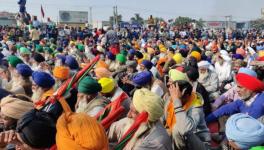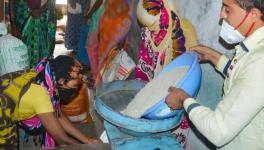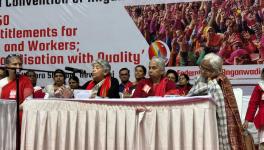Food is a Necessity, So is Making it Available
Representational Image.
Food is a necessity. Several generations in India regard this home-truth as a stark fact that they have been brought up to respect, either due to experience, or through memory. In some cases, such generations have lived on the edge of India's many Kalahandis, normally ignored, because they are ephemeral, though repetitive, in a fast-changing globalised economy. Or, they have been brought up with those whose recollections stretch back to the Bengal Famine or the perpetual food shortages of the 1940s and 1950s, when India's Public Distribution System (PDS) took shape. For them, there is no doubt about a self-evident matter: starvation means death the hard way, and India, aspiring tothe status of a great power, whether under Jawaharlal Nehru or Narendra Modi, has sought to fight it, but is equally susceptible to it. Another obvious truth is that starvation is not necessarily the outcome of unavailability of produce; it comes from the inability to use and distribute.
At the height of India’s COVID-19 crisis, these simple truths seem to have escaped India's Ministry of Consumer Affairs, Food and Public Distribution and the agencies that are meant to make India’s vast buffer stocks available to tramping legions of migrants. The Prime Minister has stated his concern. The Finance Minister has made the allocation. But confusion reigns supreme about what to do, and privation is a dreadful reality.
Partly, the problem is that what is happening cannot be docketed easily into slots familiar to India’s bureaucracy. The challenge is not presenting itself in farmers’ suicides, so regularly a cause for comment; large areas of rural India have not shown characteristics of shortage through helpless migration, as in Soviet Russia and China in the 1930s and 1950s, or in Bengal during the war. There are no riots in towns due to dearth of supplies in stores and markets. Yet, lakhs of individuals have been on the move because livelihoods are being destroyed in a larger national combat with a “great destroyer.” They, together with other members of India's “informal sector”, have rapidly become subject to hunger.
The result of their fears, and their state––their food privation––however much the consequence of misguided notions, actions and improvidence, are a community responsibility in India: for the results of acts of desperation will not be contained, as in the case of China, by the impossibility of migration in winter and the reprisals of the party state. Their situation demands answers to important questions. What are they to be fed? How much are they to be fed? How are they to be fed? Where are they to be fed? Who is to feed them?
The pivotal agency responsible for handling food shortage, the Food Corporation of India (FCI), has large buffer stocks – thrice the needs of the country if some sources are to be believed. But, it is unable to solve the problem of migrant hunger effectively. Its reserves are registered, loaded and stocked: paid for from public funds under the procurement system. In recent years, destruction of the stock has reduced. Under agreements, dating to the early 2000s, between Adani Agri Logistics Ltd. (AALL), Om Metals Infraprojects Ltd., other private corporations and the FCI and state governments, stock is increasingly not parked in jute bags and kept in godowns. Steel silos, able to resist variations in temperature and the depredations of pests, have begun to take over storage. But the bulk of the work, though initiated in western and northern India and parts of the south, is still to be done, even if “modern” godowns have been a palliative. India is joining the ranks of the best in the world for storage only slowly. Rodents who shared India’s granaries from time immemorial continue to receive their share from India's campaigns to combat hunger. Yet the FCI is unable to disburse much of what will anyway be destroyed.
In fact, though well intentioned, the transition in storage has merely added to a list of problems that the PDS faces in handling migrant hunger. Where are stocks to be released from? From silos or godowns – the provenance determining quality and speed? Already, action under the National Food Security Act (NFSA) which governs the PDS, faces issues in different states relating to entitlements of residents, let alone migrants. Who, now, will distribute, and how, to the migrant on the move? In India's PDS system this is an important question. Who, among migrants, have registered ration cards? Can they be used outside the circle of registration? Will other “identity proofs" to ensure entitlement suffice? Who is to decide? When will the decision be made as people suffer from want? And if the “system” does not work who will make up the deficit? The NGOs, who have been fighting a battle of survival while tax agencies and administrators of the FCRA have, for the highest patriotic reasons of security, made it impossible for them to work?
Starvation is peculiar. It does not kill quickly. Gandhi showed that. So have many others. But, ultimately, it kills surely. Perhaps, under the relaxation of the lockdown, a hungry family will go back to work, having been unable to move more than a hundred kilometers, and now terrified of a homecoming fraught with the suspicion of contagion? But, under a relaxation of the lockdown, will the scale of work generated be enough to finally overcome hunger? Can there be no link evolved between the regeneration of small and medium industries (SMEs) the FCI and PDS, even as MNREGA and other schemes pick up other parts of the load?
Over the three-week COVID-19 crisis, many of these issues have been raised to little avail; the thin result points to a larger problem that lies at the base of a neglect of the migrant hunger issue. That, in restructuring for liberalisation and globalisation, the multi-layered memory that Indians had of hunger and its immediacy, has faded. That the uncertainty about how to answer questions about how and why to feed is not just a product of institutional confusion, or even vested interests, though these are all probably involved: it comes from a fundamental lack of orientation to core issues of nourishment – orientation that could make institutions respond to hunger and work to prevent it.
Food is a necessity. But in recent times of consumerism and globalisation, food has also become a focus of luxury spending, endless experiment with taste, smell, colour and presentation. And arguably, in India, as in many parts of the world, as the character of inequality has mounted in the early 21st century, those who are aware of one aspect of food have come to ignore the other side to it. Hunger and deprivation are relegated to imagination about Africa. Arguably, the very nature of “poor economics” has generated also generated a problem, i.e. many susceptible to starvation and a state of want are themselves victims of a mode where they have become complicit in the destruction of something that is essential – a regard for simple nourishment. The maker of the cream waffle roll has not come to respect rice and dal. But to blame the poor for the erosion of values is outrageous. As P. Sainath has repeatedly pointed out, several ranks of society are deaf to the demands of the hungry.
The problem of the migrant’s hunger may, correctly, easily be put down to an errant state allowing want against a background of abundance, a situation so brilliantly depicted in Satyajit Ray's AshaniSanket (Distant Thunder (1973)), or to the misadventure of ignorant informal labour that is a victim of political machinations. But, let us make no mistake about both. In today's India, they are the outcome of something that reveals a terrifying truth: a social innocence about genuine starvation and want that limits public capacity to make demands of the state; insensitivity to the message in the Malayalam language hit film UstadHotel (2012) that relish for food is empty if it ignores the plight of those unable to savour it. This is an appalling comment on where India’s Republic has arrived, when much of its original project was to deal with these very problems.
The author is a former professor, University of Calcutta, and fellow, Observer Research Foundation, Kolkata. The views are personal.
Get the latest reports & analysis with people's perspective on Protests, movements & deep analytical videos, discussions of the current affairs in your Telegram app. Subscribe to NewsClick's Telegram channel & get Real-Time updates on stories, as they get published on our website.
























